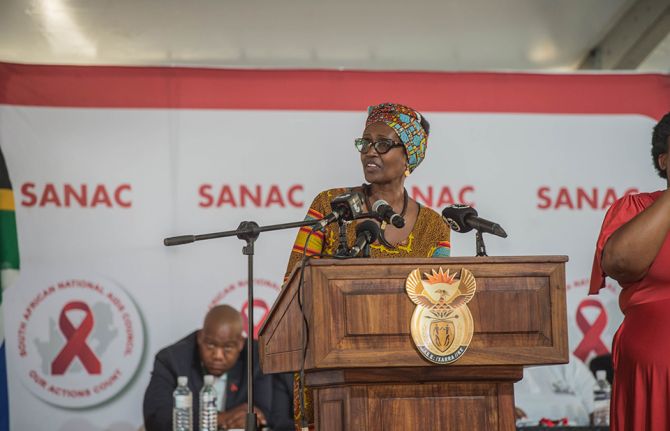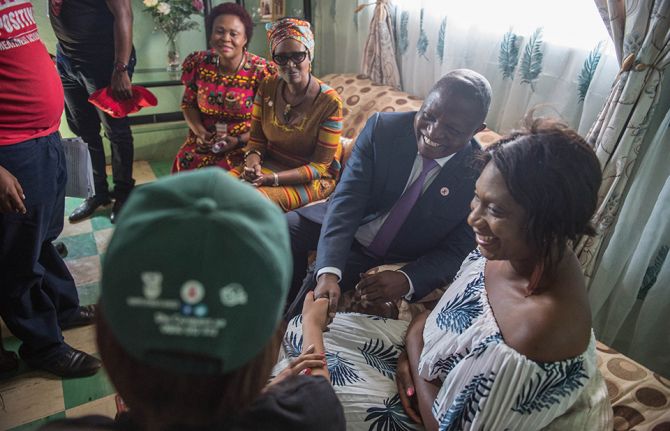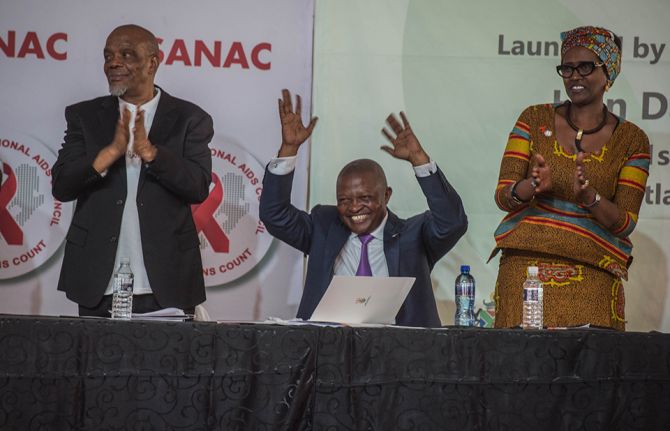



Feature Story
Communities hailed during South Africa’s World AIDS Day commemoration
05 December 2019
05 December 2019 05 December 2019Communities played a central role in the commemoration of World AIDS Day in South Africa, which was held in the rural community of Orkney, in the North West Province.
At the invitation of the Government of South Africa, the UNAIDS Executive Director, Winnie Byanyima, commemorated her first World AIDS Day as UNAIDS Executive Director in the local community. Ms Byanyima paid tribute to the role of communities in the AIDs response, including communities of people living with HIV and communities of women, girls and others at higher risk of, or affected by, HIV.
Ms Byanyima told the audience of several thousand people that it was an honour to mark World AIDS Day in South Africa—a country that was late to respond to HIV but that had made huge strides over the past decade and now had more than 5 million people on treatment. She noted, however, that there was still a long way to go, especially to protect women and girls.
“Enough is enough. All women and girls must have the right to choose if they have sex and with whom, and how they protect themselves. We need to bring power, equality and agency to all young women and girls,” she said.
Ms Byanyima said we must never accept that people living with HIV are still dying of AIDS. “It is not a question of science. It is a question of inequality, powerlessness and exclusion. The system is still failing for those who are marginalized,” she said.
South Africa’s Deputy President and Chair of the South Africa National AIDS Council, David Mabuza, told the World AIDS Day event audience that South Africa’s AIDS response had succeeded thanks to the work of communities and the contributions of activists and development partners.
“We could not achieve this without partnerships and support from our global partners,” he said. “That is why we must appreciate the contribution of the global campaign by UNAIDS that has galvanized political leadership, civil society and the private sector into coherent action. Community action remains an important pillar in making change happen, and in shaping the policy agenda and outcomes.”
He noted that there was still much work to be done, including intensifying HIV prevention and tackling contributing factors, including providing comprehensive sexuality education and ending gender-based violence.
Mr Mabuza also said he was pleased to be joined by Ms Byanyima. “She is an activist of note and a distinguished advocate for human rights and development,” he said.” We have no doubt that her vast experience in political leadership and human development will take us forward in the struggle to end the AIDS epidemic.”
In the days prior to the World AIDS Day commemoration, Ms Byanyima met with political and civil society leaders, women activists and others to hear their concerns and understand the challenges and opportunities facing South Africa.
She also visited a clinic in Soshanguve, outside Pretoria, to see in action the project Ritshidze (“saving our lives”), which aims to improve the quality of HIV and tuberculosis service delivery in South Africa by empowering people living with HIV to monitor the health services they receive and to advocate for changes needed. The project is funded by the United States of America with support from UNAIDS.
"We can spend billions building beautiful clinics to distribute millions of pills,” Ms Byanyima said. “But only if we empower communities at the grass roots to hold service providers accountable and call out injustices will we make a real difference for people."



